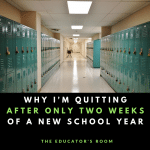 You are not guaranteed a job when you graduate college. That is the reality of today’s world. According to Peter Capelli, a professor at Wharton School quoted in a recent Washington Post article, a discrepancy exists between the amount of college graduates and the amount of jobs available for said graduates; many current employers are not looking for college-educated employees. The exceptions to this rule are degrees in engineering, technology, mathematics, or science.
You are not guaranteed a job when you graduate college. That is the reality of today’s world. According to Peter Capelli, a professor at Wharton School quoted in a recent Washington Post article, a discrepancy exists between the amount of college graduates and the amount of jobs available for said graduates; many current employers are not looking for college-educated employees. The exceptions to this rule are degrees in engineering, technology, mathematics, or science.
Yet society tends to push all children toward college while ignoring the other options available for building a stable career. Perhaps we push because once upon a time, college was not available, affordable, or even practical for everyone. We rightfully decided to change that and did what we could so that everyone who needed it or wanted it could go. But even then we may have failed to value or even acknowledge that college is not the only way. Aggravating the issue are education policy-makers with good intentions. Many of them attended college and might believe everyone else should go, too. Furthermore, colleges depend on enrollees to make money, so it stands to reason that they would encourage as many applicants as possible. (That is not to say that you should be distrustful of every college employee of course.)
For some kids, traditional college is unfeasible. For others, it is undesirable. Those who struggle with severe learning disabilities might fall short of their professors’ expectations even with their legally-required accommodations being met. Someone who reads and writes at an elementary level will find it difficult to comprehend the complex reading or to produce the standard essays many college classes require. While one could argue that students being allowed to graduate high school with such dastardly reading and writing skills is an injustice and demand that the system undergo reform (hah), that doesn’t help the older students who are quickly approaching a crossroads in life and need to make a decision now. Others could debate that college campuses offer tutoring, but tutoring is meant to assist students who need help with minor issues, such as choosing the best sentence structure or reviewing the day’s calculus equation; college-age students who are reading and writing at a beginner’s level is not minor. Many of these students who experience frustration in traditional classroom settings (i.e. those that require abstract reading, writing, discussions, etc.) have no desire to attend college, anyway. Heck, there are students who could excel in these settings who do not desire to attend college, either.
And with today’s career prospects dismal for many with college degrees, why should we push everyone to attend college? Quite frankly, we should not. And not all of us do. Some schools offer information to students and their families about several postsecondary options, including trade schools, military service, volunteer organizations, and yes – college.
As things are now, college is the best option for students who have a strong aptitude toward (as well as an interest in) STEM fields. (STEM stands for science, technology, engineering, and math.) Trade schools, on the other hand, offer a variety of apprenticeship programs that help students acquire specific skill sets. Most employers today, Capelli points out, are looking for skilled employees as opposed to degree-holding employees. Additionally, trade schools take less time to complete, which enables students to enter the workforce sooner, and graduates of trade schools have the potential to earn a respectable income. And let’s not forget that the military and various volunteer organizations, like the Peace Corps, offer a wealth of opportunities, too.
Rather than tell students that college is the only way to go, we should educate students about all options so they can make a cognizant decision about the best way to accomplish their career goals. If schools are not offering this information, then they should make strides to do so. Schools that are offering this information should ensure they are doing everything reasonably possible to advertise that they have it. (Of course, this will have no effect on those who have no desire to become productive members of society, but this argument is not about them.)
In addition to disseminating information, many public schools offer a variety of classes to suit individual interests. In Tennessee, public school students are required to choose a career cluster and take three elective classes based on that cluster. Career clusters range from finance to education and training. To illustrate, students who choose hospitality and tourism might take a culinary arts class to satisfy the elective requirement. Career clusters fall under the state’s Career and Technical Education (CTE) program. Other states have similar set ups.
For the most part, the CTE program and its counterparts across the nation are sound in theory. They allow for students to set goals first and find the path to accomplish those goals second. Instead of assuming “I have to go to college because that’s what everybody else does,” students can instead contemplate, “I really want to become a (insert job title) one day, and I need to find a trade school/enter the military first/join a volunteer organization/attend college (or any combination of the former) to get there.” Again, note that college is not the only postsecondary option.
The CTE program and its equivalent programs do not provide all the solutions, however. Career clusters work best for students who are decided upon a career. Students can remain undecided even after taking skill and interest inventories to help them narrow their focus. By default, some well-intentioned individuals might tell these students to enter college to gain some general knowledge or to find their way after taking several different classes. Today, sadly, that is foolish advice for people who have limited resources.
In fact, the best advice to give any career-seeking student in today’s circumstances is this – know what you want before you attempt to get it. Unless you have the money to spend, you should never enter anything undecided. Also, consider whether the career you want is actually obtainable in the projected job market. Do not make an uninformed decision, and especially do not go to college with the hopes of landing a job just because you went to college. There is more to it than that.





